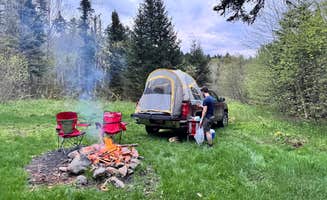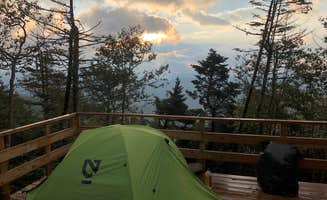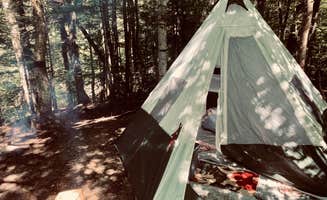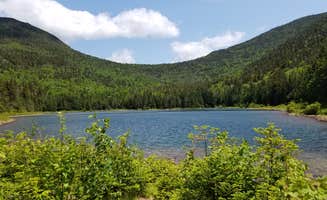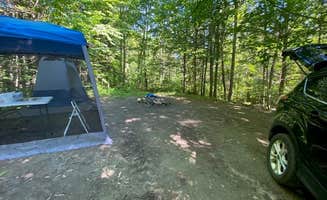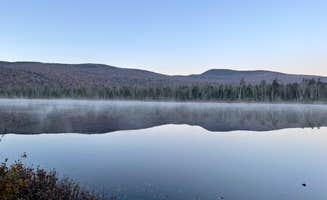Primitive camping near Bretton Woods, New Hampshire offers a mix of backcountry and roadside options throughout White Mountain National Forest. Camping elevations range from 1,200 feet along river valleys to over 4,300 feet at mountain shelters. Most forest roads remain unpaved with varying conditions that deteriorate quickly after heavy rainfall, requiring careful vehicle selection and timing.
What to do
Mountain hiking access: Guyot Shelter serves as a strategic backcountry base for accessing the Bond Cliff trail system and summit views. "We got to the site, claimed our platform and hiked over to West Bond to catch a beautiful sunset," reports one visitor who appreciated the shelter's positioning for evening summit trips.
River activities: Primitive sites along Town Hall Road Dispersed offer direct water access with fishing opportunities. "About the fifth one or so, you pull in and the fire pit is right there. Then walk down a bit and there's a large group site with another pit. Down toward the river there was plenty of open space so we pitched there and built a fire pit," noted a camper who enjoyed the riverside location.
Trail connections: Several dispersed camping areas connect directly to the extensive White Mountains trail network. "Amazing spot. Pretty remote and all the better for it," explains a camper at Guyot Shelter, highlighting how the isolation enhances the hiking experience while providing shelter amenities.
What campers like
Wildlife observation: Woodland settings create opportunities for animal sightings. At Cherry Mountain Road Dispersed, the natural environment offers exceptional quiet for wildlife watching. "The camp site are all disbursed enough that we did not hear any other camping sounds at all. It was so quiet I could hear the sound of crow wings flapping as they flew by," one visitor noted.
Site privacy: White Mountains Camping on Little Larry Road receives consistent praise for well-spaced sites. "8 huge, beautiful campsites in the heavily wooded Evans Notch section of The White Mountains National Forest. It's easy to forget there are other people camping on other sites because they're so far apart," explains a camper who appreciated the isolation.
Water sources: Many primitive camping options feature natural water access. "Highwater trail with bridge close by. Great stars. Creek runs through road near sites good for getting water to filter or washing," reports a Little Larry Road camper, highlighting how natural water sources enhance the primitive camping experience.
What you should know
Weather challenges: Rapid weather changes affect camping comfort throughout the region. "We went during a pouring rain storm and our site remained relatively dry. We even enjoyed a small fire the next day," shared a Town Hall Road camper, noting how site selection impacts weather resilience.
Navigation confusion: GPS devices often provide incorrect directions to remote camping areas. "GPS initially took me on the wrong road - make sure you stay on Town Hall Rd no matter what the GPS says," warns one camper about technology limitations in the mountains.
Site security concerns: Unattended gear may disappear at popular spots. A visitor to Haystack Road reported, "I left out gear to claim a spot while out hiking and came back to people having stolen some of it as well as setting up in that spot. Cut my trip short because of that experience."
Tips for camping with families
Riverside options: Select sites with water features for natural entertainment. "We stayed on site #5 because it was flat, sunny, grassy and had a little brook," noted a camper at Cherry Mountain Road about finding family-friendly terrain.
Site spacing consideration: At Tripoli Road, site selection impacts family privacy. "A lot of sites were right next to each other so if it's crowded, you might not get a lot of privacy. However, there are little camp spots all over this road, too many to count so it's a good bet of getting one, especially on the weekdays," explains a visitor who navigated the varied camping options.
Weekend versus weekday arrivals: Timing significantly affects site availability for families. "Great sites. Some right on water. First come first serve, can get busy," warns a Town Hall Road camper about competition for prime family-friendly locations, especially those with water access.
Tips from RVers
Access road assessment: Most dispersed camping roads require careful navigation with larger vehicles. "The road was not as bad as I anticipated. There was room for my Jeep Grand Cherokee towing a squaredrop camper to pass the very few oncoming vehicles we encountered," explains a Town Hall Road visitor who successfully managed with a small trailer.
Site leveling challenges: Finding flat spots for vehicles requires scouting. "We got lucky and snagged a perfect spot 2 miles in from the entrance sign- completely level (didn't even need our leveling blocks) and big enough for our 26ft class c," reports another Town Hall Road camper who noted the rarity of finding naturally level sites.
Size limitations: Most primitive sites accommodate only smaller RVs. "There are a string of tent sites on either side of the road with some right up to the intersection with Cherry Mountain trail. A few were small and could just fit a tent and a car, where some offered more space," explains a Cherry Mountain visitor, indicating the tight quarters for any vehicle camping.


